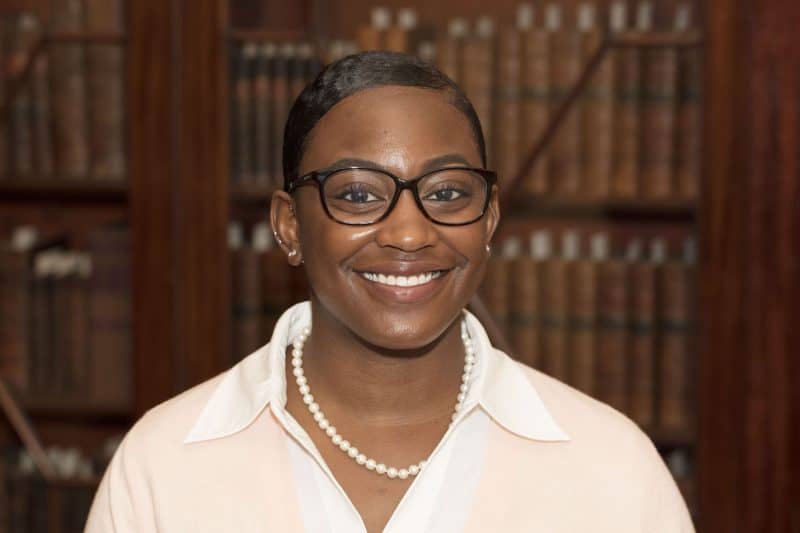African American History Specialist Awarded Rare Book School Diversity Fellowship
African American History Specialist & Reference Librarian, Jasmine Smith
This year I was selected for the RBS-RBMS Diversity Fellowship. This year’s theme of “Response and Responsibility: Special Collections and Climate Change” was an eye opener in more ways than one. Some of the moments that impacted me the most are mentioned below.
I thoroughly enjoyed the Booksellers’ Showcase Opening Reception. Recently, I began recommending collection materials related to African American history for acquisition at the Library Company. It is important to me that I uphold the standards of the Library Company’s reputation and continue to acquire highly rare materials that are important to the Library Company’s mission, as well as to scholars researching African American history. However, being relatively new to this profession, I find this somewhat difficult to do. In January, I took the RBS course C-30, Developing Collections: Donors, Libraries, & Booksellers, which provided me with insight on how to navigate the antiquarian marketplace and how to assess aesthetic and research value of potential acquisitions. The opening bookseller event was a great networking opportunity because it provided me the chance to reconnect with a few booksellers I met while taking the RBS course, but also gave me the chance to introduce myself to potential booksellers and inform them of the materials that I would be interested in acquiring.
The topic of climate change and science, policy, and how this will impact libraries, archives, and cultural heritage work in plenary 1, Response & Responsibility set the tone for what would be a very informative conference. Having speakers such as Frances Beinecke and Brenda Ekwurzel who are highly involved in finding solutions to everyday environmental challenges, provided me with contextual information on a subject matter that sometimes falls underneath the radar. Although I’m aware of global warming and other climate changes, the thought of the world ending is a scary thought, one that most, myself included, avoid thinking about on a daily basis. Bethany Nowviskie’s presentation in this plenary put my mind at ease in the sense that I’m not alone with how I feel but also that we should work together to make a change for future generations. She stated, “Starting to write and talk publicly was a frank attempt to assuage my terror and my grief—my personal grief at past and coming losses in the natural world, and the sense of terror growing inside me, both at the long-term future of the digital and physical collections in my charge, and at the unplanned-for environmental hardships and accelerating social unrest my two young children, then six and nine years old, would one day face.” Hearing her say this with the image of the gloomy black world on the screen behind her put it in perspective that we as librarians, activists and other cultural institution professionals should make a great effort to protect our collections for future generations from unforeseen events.
The Library Company houses one of the nation’s most important collections of pre-1900 African American textual and visual materials. Comprising more than 15,000 titles and 1,500 images from the mid-16th to the late-19th centuries, the African Americana holdings include books, pamphlets, newspapers, periodicals, broadsides, graphics, photographs, and manuscripts. Due to this time period, the majority of the materials collected are culturally sensitive in today’s era.
I recently curated an exhibition, From Negro Pasts to Afro-Futures: Black Creative Reimaginings, that focused on how black historical actors envisioned a glorious black future. By displaying fragments of early Black Americans’ past from their drawings, love letters, poems, songs, speeches and protests against the evidentiary material of their imaginings of the future, the Library Company can help visitors grapple with the place of black creative genius in the quest for a people’s liberation. I found the seminar on “Ethical Outreach with Culturally-Sensitive Content: Practices, Provocation, and Power” provided extremely useful tips for my job duties as a librarian. More specifically, Ruth Ann Jones’ from Michigan State University discussion on how she handles class presentations was especially helpful. She mentioned that when she is showing an item that has a caricature or negative stereotype, she always offsets it by displaying a positive item in the same category, highlighting materials that are self-representative of the people depicted. For example, her PowerPoint displayed a cookbook with an image of African American caricature drawings on the front alongside another cookbook with a tasteful image of an African American chef.
Overall, the RMBS conference was a great experience and provided me with an opportunity to surround myself with other professionals in the field!
Jasmine Smith
African American History Specialist & Reference Librarian


![Illustration [or Illustrations] from an article on Boffin’s Bower, Frank Leslie’s Illustrated Newspaper 26 June, 1875.](https://librarycompany.org/wp-content/uploads/2lper-1575-f-v40-1875-p257-80x80.jpg)
